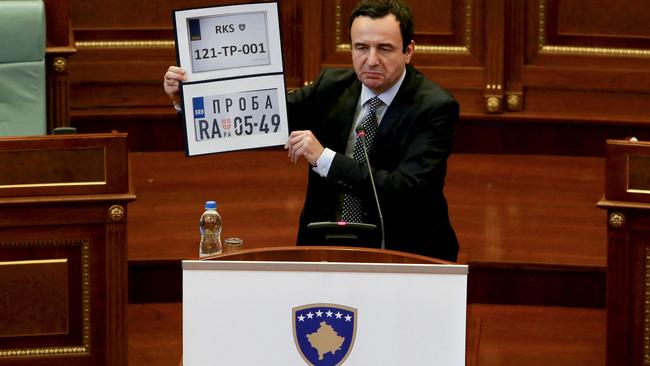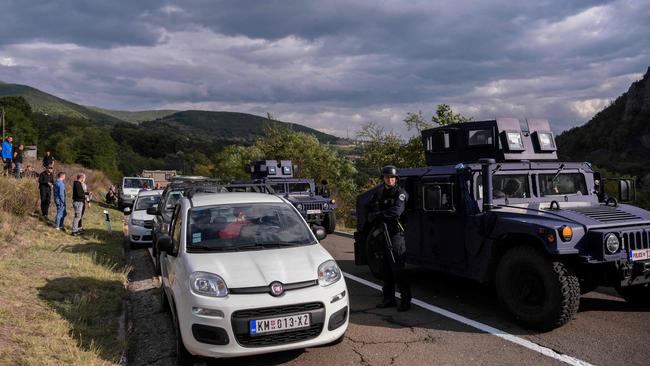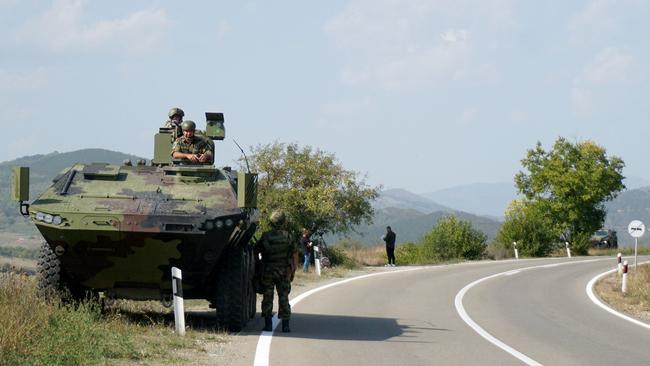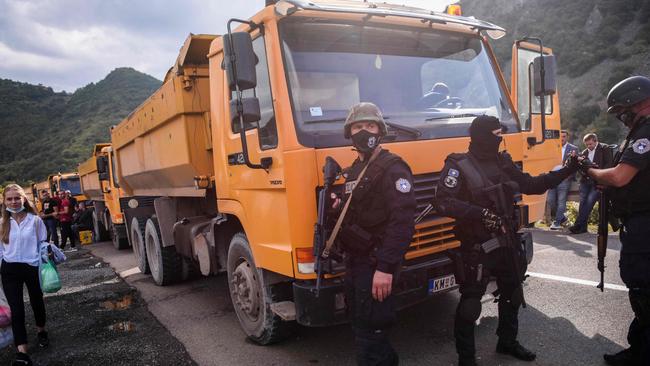Kosovo licence plate sparks dangerous tensions with Serbia
Decades-long tensions between two mortal enemies are reaching dangerous levels, with grenades thrown and troops on high alert – all because of a licence plate.
World
Don't miss out on the headlines from World. Followed categories will be added to My News.
Afghanistan may not be the West’s only nation-building catastrophe. Serbia and Kosovo are once again at each other’s throats. And Russia’s set to be the big winner.
All it took was a number plate.
Hundreds of ethnic Serbs have swarmed onto border-crossing roads to protest having to use Kosovo-issued number plates in Kosovo. These have the characters RKS stamped on them – short for ‘Republic of Kosovo’.
That implies its status as an independent nation.
That idea has Serbia outraged.
Even though it insists Kosovo drivers use Serbian number plates in Serbia.
Grenades have been thrown. The Kosovo vehicle registration office has been set on fire.
Now Serbia has sent special forces troops to border checkpoints after its President declared there were limits to what he would “tolerate”.
It’s a spat in many ways similar to that of Communist China’s insistence that neighbouring Taiwan is merely a wayward province – and not the last holdout of China’s old Republican government.
This intractable sovereignty dispute has been simmering for decades.
Kosovo unilaterally declared independence after a brutal conflict between mismatched religious and ethnic groups drew a NATO military response in 1999.
Serbia refuses to accept Kosovo’s 2008 declaration. Some 117 nations, however, have.
Now, amid intense government upheaval, Kosovo is facing a make-or-break moment.
And so is Europe.


Balkan crisis
“With two decades of war in Afghanistan coming to the grimmest of possible ends, it is worth remembering that three decades have now passed since war came to the Balkans,” former UN peace envoy and prime minister of Sweden Carl Bildt wrote recently for Project Syndicate.
“Both are case studies in how the mismanagement of war can have devastating effects that linger for decades.”
Two decades after former Serbian president Slobodan Milosevic’s ethnic-cleansing campaign sent the Balkans into civil war, its fallout remains raw.
Kosovo Serbs and Albanians live in clearly delineated districts. Street signs must be written in both languages. But their education and health systems are strictly separate.
The tiny province is just part of what was once Yugoslavia.
After the fall of the Soviet Union, the Balkan Peninsula divided along largely ethnic-religious lines. Slovenia. Croatia. Bosnia. Serbia. Montenegro. Macedonia.
Naturally, there were areas of overlap.
Kosovo was one of them.
Three and a half years of civil war cost the Balkans more than 100,000 lives and saw millions evicted from their homes.
On March 24, 1999, NATO launched a 78-day campaign of air strikes against the Serbian military. Mr Milosevic eventually relented, allowing peacekeepers to enter Kosovo.
War crimes investigations and independence negotiations have continued ever since.
Thousands of NATO peacekeepers, including US troops, are still in the province. Their mission is to keep the lid on boiling ethnic tensions.

Clear and present danger
“No one expected that to happen overnight; but nor did anyone think the integration process would be as drawn out as it has been,” Mr Bildt writes.
He blames corruption, nationalism and extremism for the fading international support.
Serbian Defence Minister Nebojsa Stefanovic toured armed border garrisons on Thursday. Several Serbian combat jets flew overhead. Tanks and troops have since been deployed.
“Our army is not provoking, but it’s ready to protect its people,” Mr Stefanovic insisted.
Serbian President Aleksandar Vucic appeared on Serbian television saying he was “concerned” about violence targeting Serbs in Kosovo.
“We have made clear what are the boundaries by which we will tolerate violence,” Mr Vucic said. “Both the Europeans and Americans know that. We have said very precisely what our next moves will be, and in which order they will be made.”
Kosovar Prime Minister Albin Kurti has rejected reports alleging ethnic Serb protesters have been beaten by police.
Talks aimed at settling the conflict began in 2011. The Serbian President and Kosovo’s Prime Minister reconvened last month after walking out on each other more than a year ago.
It didn’t go well.
“It was not an easy meeting,” EU envoy Miroslav Lajcak admitted. “But it was important that it happened. Both leaders had a very open and frank exchange on what they each want from the dialogue.”
Things have only gone downhill since.
The tit-for-tat licence plate rules are just one example.
Kosovo President Vjosa Osmani says the world must “not ignore what is clearly seen – a Russian-Serbian move to damage the European Union and NATO”.
“It is time that the international community, and first of all the EU and NATO member countries, see such a danger and prevent the Vucic regime from realising its goal of creating the ‘Serb world’,” she posted to Facebook while attending the UN General Assembly in New York.
Clash of civilisations
“Serbia has come under the boot of an autocratic regime that flirts with China one day and kowtows to Russia the next, all while its representatives continue to put on a good face at the European Commission in Brussels,” Mr Bildt says.
“Despite enormous efforts by both the EU and the United States, the outstanding issues between Serbia and Kosovo are nowhere close to being resolved.”
Only a binding sovereignty agreement can see Serbia and Kosovo join the European Union. Germany says it won’t allow Serbia in without one. Other EU states are blocking Kosovo for the same reason.
Outgoing German Chancellor Angela Merkel declared days before she departed that Serbia and the entire Balkans region had a long way to go before earning access to the European Union. Meeting with Serbian President Aleksandar Vucic, she said his country needed to reach towards being a “Reichsstaat” – a nation under the rule of law.
Mr Vucic says he no longer cares.
“We were very enthusiastic about the accession process – today we are not,” Mr Vucic said. “We don’t care anymore.”
But Russian President Vladimir Putin still yearns for the days when the former Yugoslavia was part of its Soviet Empire. That’s behind his unwavering support of Serbian nationalists.
And that’s made it popular.
Mr Vucic insists any Kosovo solution has to be a compromise, “not a solution that will be humiliating and defeating for Serbia”.
So he’s been seeking support elsewhere. And his moves to strengthen ties with Moscow and Beijing have Brussels on edge.

Game of thrones
Early in September, Kosovo administrators warned of a “Russian diplomatic war against Kosovo”.
It accuses Moscow of actively trying to undermine Kosovo’s independence ambitions, destabilising diplomatic and economic support for the province, and rewriting the history of war crimes committed during the collapse of Yugoslavia.
The accusation matches Moscow’s profile.
From Syria to Venezuela, Russia has been actively supporting authoritarian “strongmen”.
Mr Vucic fits that profile.
He has been accused of steadily dismantling Serbia’s democratic institutions. Democracy watchdog Freedom House recently downgraded its status to that of a “hybrid regime”.
And, to enter the EU, Mr Vucic knows he would have to surrender much of his “strong man” status.
Meanwhile, Mr Putin has made the Balkans a frontline in his “grey zone” conflict with the West. Economics, politics and information have been weaponised to pull Serbia out from under the EU’s influence.
Lately, it’s been busy rearming Serbia’s military.
Washington has been refusing to do so, citing widespread corruption as its chief concern.
But Russia’s influence isn’t the EU’s only hurdle when it comes to stabilising the West Balkans.
China has invested $US4 billion ($A5.5 billion) and loaned another$US5 billion ($A6.8 billion)to Serbia. And its diplomats are increasingly active in the region.
The European Union, Mr Bildt says, has one last shot at peace: It must ensure an outcome from a summit with the Balkan states scheduled for October.
“The alternative for the Western Balkans is a slide backward into violence. It has happened before. It is happening now in Afghanistan. It must not happen again in Europe.
More Coverage
Originally published as Kosovo licence plate sparks dangerous tensions with Serbia




